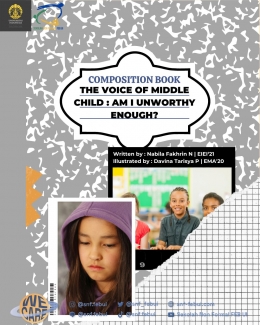"You know that feeling when you raise your hand amongst a sea of people and nobody calls on you? That's a big middle child syndrome energy." -Thompson-
A couple of months ago, there was a trend that happened and was done by many users on the TikTok platform. These video trends are allegedly voicing the heart of a middle child who often feels neglected and unworthy within their family. These kinds of video trends are known as middle child syndrome. It refers to the belief that middle children tend to be ignored and almost completely forgotten. It is also believed that the middle child often thinks, feels, and acts as a form of managing expectation and reality in relation to their birth position which lies between their siblings (Rudi, 2020) [1].
Get to Know More!
Surprisingly, this phenomenon is not such a new thing because this study was done by an Austrian in 1964. Alfred Alder, an Austrian psychotherapist, has conducted and developed a study linked to the order of birth. Then, he gave a statement that children who lie in the middle are most likely to be overshadowed. Due to this study, the middle child feels they have no particular role and struggle with their status within the family. As we can see, the first child is sometimes more likely to be more ambitious and responsible. We can assume, when the sibling is born, the first child inescapably has to adjust to participating their parental attention to the sibling. [2] According to Gerald (2005), the first child tends to experience stress and bring a kinds of parents' hopes and expectations because of unrealistic and high expectations that their parents has create to them. Thus, the first child seems to be more ambitious to achieve their goals to make their family proud.
Besides that, the youngest one has a greater chance of being spoiled because mostly the parents treat the younger child more protective than the older one. They also frequently forget to provide equal child participation within the family. The youngest child may be given the freedom of daily life by their parents. Herbert (1998) pointed out, the youngest child can behave selfishly as a consequence of this condition. In addition, they often remain the "family babies" until adulthood, this is expecting others to be responsible for their actions.
As a result of these characteristics, there is a greater chance to encourage the middle child to feel overlooked since they haven't received much attention and love either. Hence, a middle child can be considered as a sandwich by seeing their position [3]. In most cases, they do not feel like a family favorite because of their conviction that 'favoritism' only happens for the oldest who is considered as special since their awaited birth, or the youngest child who is considered as a family baby.
Is It A Real Thing? Does It Affect Them in Their Adulthood?
Alder's theory has led to a deeper look at how psychological development is affected by order of birth. His principle emphasized the birth order as an essential domain of family structure that determines personality and behavior. As the theory explained, the first child most likely had leadership abilities; the middle child tries to compete with other siblings for recognition; while the last child is pampered and loved by family members, making them difficult to be an independent person [5]. Unfortunately, while some studies show evidence supports a birth order effect, other results show contradiction. Despite those middle child syndrome beliefs believed by many, more research is still needed and being explored.
According to McGwan and Beck's experiments, no proof was found supporting the idea that middle siblings are any more self-assured, motivated, or aim-oriented than siblings. Thus, there is a contradiction to standard wisdom. Since there are numerous factors that are not just the 'middle' label and occupy a number of different positions within the family depending on the number of siblings, hence offering numerous perspectives on personality and relationship development.
However, this study is still under investigation because we need research within families to get the accurate information we need and that information often discourages us from believing the birth order hype. Some research suggests that there may be small effects of birth order on some aspects of who we become. Besides that, they also suggest that personality and life outcomes can be influenced by a variety of social and familial factors. Coulson explained, generally, learning birth order theory is like learning Myers-Briggs Type Index or astrology. It means, when we search for similarities while we read about those explanations, we'll discover them. But, since this theory does not represent all, we should not take it for seriously.
Let's Take Another Look : A Blessing in Disguise







